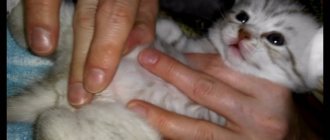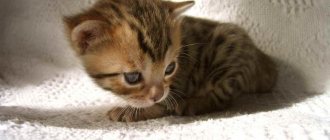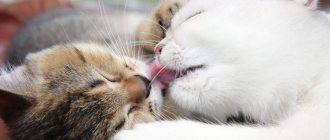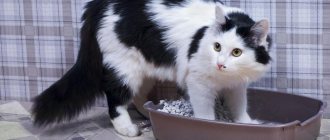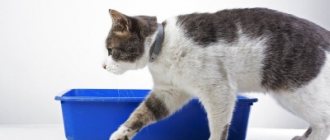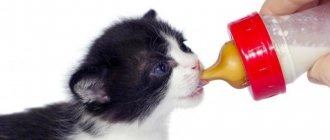Regularly checking how often our kittens poop is a task that may seem thankless to us, but it is our job as humans responsible for their well-being; and this is not only an important element of control from the point of view of power.
Observing their litter box and getting an idea of how many times it is used every day gives us a lot of information about their health and, above all, useful information about when to worry and perhaps consult a doctor.
We're pretty sure that most people caring for a kitten would prefer not to think about this particular aspect of their daily lives. However, checking his poop regularly is just as important as taking care of his hygiene or ensuring proper nutrition, so it's good not to be squeamish and serve our little friend.
© shutterstock
In fact, with the help of such monitoring, we can understand if the kitten has any health problems, which, if not identified and treated in time, can cause serious damage to our kitten's body. Of course, none of us want this to happen, but no cat can communicate openly when something is wrong: we must always be vigilant and pick up any useful clues.
So, let's look at what we need to be careful about when it comes to our kitten's feces, as well as what signals there may be that indirectly tell us about a possible change in his health.
When do kittens start pooping?
The health of animals in childhood and adulthood directly depends on how well babies have defecation and urination.
Inexperienced owners may think that their pet does not go to the toilet until almost a month old, because they do not find traces of vital activity on the litter. However, like any living organism, the kitten empties its intestines and bladder.
This happens from the very moment of birth, but the cat helps babies go to the toilet by massaging the cubs’ stomach and anal area with their tongue, stimulating defecation. After the cub has done its business, the mother licks the urine and stool, which has a consistency similar to a thick paste.
Toilet for newborn kittens
In the first two to three weeks of life, the cat fully cares for its offspring and helps them go to the toilet. By licking newborn babies, a caring mother cleanses the fur from pathogenic microorganisms, foreign odors, dirt, and stimulates digestive processes. This “massage” allows you to get rid of foreign gases in the intestines, promotes natural emptying, and cleanses the body of harmful decay products. The cat licks all the secretions. A newborn kitten should go to the toilet 7-10 times a day .
Digestion is a complex physiological process aimed at releasing energy, which is necessary for normal well-being, vital activity, and the functioning of internal organs and systems. In the gastrointestinal tract of animals, complex compounds are converted into simple ones, accessible for absorption, which subsequently take part in metabolic processes - metabolism. The body is saturated with useful nutrients - vitamins, macro-microelements.
In the first month after the birth of kittens, the gastrointestinal tract is formed and colonized with beneficial microorganisms that produce the necessary digestive enzymes.
© shutterstock
Starting from three weeks, babies, in addition to mother's milk, can receive complementary foods: cottage cheese, natural yoghurts, low-fat boiled, chopped meat, special ready-made canned food marked “For small kittens.” With a properly selected diet, the process of defecation occurs independently, without any problems.
Important! Toxins, harmful components, undigested substances must be promptly removed from the body of animals during the act of defecation and urination. Otherwise, severe intoxication of the body may develop.
Unfortunately, inexperienced primiparous cats do not always properly care for their offspring in the first month and forget about their direct responsibilities for caring for the newborn offspring. The kittens' tummy, swollen from gases and feces, causes severe discomfort and provokes pain. Therefore, owners should not only very carefully monitor the condition of the mother cat, but also the little kittens.
If newborn kittens have a tight, enlarged tummy, the babies constantly meow, show restlessness, and cannot go to the toilet for more than five days, you can alleviate their condition with an ordinary soft-bristled brush, sterile gauze, or a bandage.
Using available means, gently massage the peritoneum of small pets five to eight times a day, irritating the animals’ groin area (anus, urinary canal).
How to understand that a kitten wants to go to the toilet
The mother maintains the hygiene of the offspring for about the first four weeks, then the young animal begins to solve toilet issues on its own.
In order for the kitten to remember well where its latrine is and not make mistakes, the owner needs to learn to recognize the signals of a pet that wants to go to the toilet.
In order for the kitten to remember well where its latrine is and not make mistakes, the owner needs to learn to recognize the pet’s signals
It's easy to notice:
- if the baby runs around the room, intensively sniffs objects and the floor, uses his claws, then he is looking for a place where to do big or small things;
- if the kitten scratches the floor and tries to dig a hole for the toilet, then you urgently need to transfer the animal to the tray;
- the eyes of an animal that is in a big mood are frozen and as if glassy.
Be sure to read:
Wood litter for cat litter: types, the best companies, how to use, pros and cons
Kittens at a tender age already understand where their toilet is and, due to the cat’s innate cleanliness, they want to go there. If there are misfires, then it is an accident or illness.
How to encourage a kitten to poop
- Position your kitten for stimulation : After feeding, hold him firmly and gently with his back to you and place your non-dominant hand under his belly. Make sure the kitten is stimulated in a warm environment; otherwise he may get sick and even die.
- Spreading a warm, damp washcloth over your dominant hand : You will need this washcloth to stimulate your kitten's anal area and belly to get the kitten to poop. A warm, damp cloth can replace mom's tongue.
- Moving the washcloth over the kitten's butt : Using your fingers, gently massage the kitten's anal area with the wet wipe. Your thumb needs to replace the mother's tongue for the kitten to poop.
- Check : Continue massaging until the kitten finally poops, usually no longer than about 60 seconds.
- Adjusting the Washcloth : Continue rubbing and adjusting the damp cloth as needed to ensure the feces are properly removed from the kitten. Discard unclean materials and continue massaging.
© shutterstock
How often should a kitten poop: normal bowel movements by age
Each period has its own defecation norms. Before 3 weeks of age, a healthy animal usually poops 3-6 times a day. The tummy should be soft and toned. The stool has a mushy consistency.
Each period has its own defecation norms.
If it contains mucus, blood, undigested food, or is too dry or greasy, then this is a reason for the animal to be examined by a veterinarian. When calculating, you should understand that babies can sometimes relieve themselves in the most secluded place.
As a cat grows, its nutrition changes, the thickness and density of feces increases, and feces become almost the same as those of adult animals. The number of visits to the tray is largely determined by what is included in the diet.
If it contains more plant fiber, then the kitten will poop less than when fed food with a predominance of proteins. Typically, a grown animal defecates 2-3 times a day.
What should owners be wary of?
Since small kittens, adult cats, and cats like to relieve themselves in secluded places, it is not always possible to track how many times a day the pet visited its litter box or went to the toilet. Therefore, from the first days of the animal’s appearance in your home, after the completion of the adaptation period, as soon as the cat begins to trust you and gets used to the new environment, carefully monitor its behavior, habits, and general physiological state.
If the kitten is active, cheerful, gaining weight well, the tummy is soft, the fur is shiny, and the pet goes to the toilet normally - there is no reason to worry.
If kittens poop frequently, the stool is loose, has a specific sharp unpleasant odor, and foreign impurities are noticeable, contact your veterinarian for help.
The following symptoms should alert owners of furry pets:
- decreased overall activity;
- inadequate response to external stimuli;
- uncontrollable behavior of a pet;
- deterioration of coat;
- rare visits to the tray;
- enlarged, large, tight tummy;
- nausea, vomiting, diarrhea;
- decreased appetite;
- increase in body temperature.
Feces that are too thick, brownish-green, dark or, conversely, too light in color may indicate disturbances in the functioning of the gastrointestinal tract. The problem requires an immediate solution to avoid serious consequences.
How many times a day does a kitten pee
Babies begin to write from birth. The bladder in newborns is very small, so as much fluid enters the tummy, approximately the same amount should come out in the form of urine.
The rate of urination in the litter box in babies is 10 times a day, decreasing by 3 months of life to 5-6 urinations, and up to 2-3 times in adult animals.
The frequency also depends on the sex of the animal. Boys have narrower urethra than girls, so they urinate more often (up to about 5 times a day). It is necessary to ensure that the urine is clean (no mucus, blood, cloudiness) and that the process of urination is painless.
Be sure to read:
How many times a day should a cat pee: the norm for an adult animal and kittens, when deviations are safe
While getting used to a new home, the animal often experiences stress, and for the first few days it may pee somewhat less frequently.
Why do problems with stool occur?
If an older kitten with well-opened eyes eats and drinks well, but cannot walk around every day, then there are the following reasons for this:
- Stress. Very often, a kitten suffers from constipation due to stress. Early weaning from a cat has a particularly difficult effect. The kitten, missing its mother cat, sometimes experiences difficulty passing stool for 5 days. If kids in a new home cannot go to the toilet on their own during this time, then there is nothing wrong with that. If the situation does not resolve after 5 days, then you need to visit a veterinarian. You need to try to make the cat calm down; as soon as he gets used to his new place of residence, the situation should resolve itself.
- A kitten may have difficulty passing stool if it has an improperly balanced diet. When a cat finds itself in a new home, you should try to initially stick to the same menu as the old owners. It is best to use specially formulated food for babies. When a cat eats natural food, it is better to include plant foods, boiled meat, and cereals. After the new owners select suitable food for the babies, they themselves begin to go to the toilet. How many times a cat goes to the litter box depends on what it eats. He can go up to 4 times a day if he eats food rich in fiber; when eating meat, cats visit the litter box about 2 times a day.
- Another common cause is constipation. When a kitten cannot poop for about a week, it may have a health problem, which led to the development of a similar situation. In this case, the pet must be shown to a veterinarian; only he can correctly assess the situation and prescribe treatment.
What to do if the kitten often goes to the toilet in small ways
If a situation arises that your pet begins to go to the litter box too often, you should pay attention to this disruption of the body’s functioning and visit a veterinarian. A constant urge to urinate may indicate that your pet has a disease of the genitourinary system.
If your pet starts going to the litter box too often, you should pay attention to this.
The reason may lie in a stressful situation or increased water consumption. Cats may suffer from urinary incontinence or may simply be marking their territory.
Diseases are provoked by the following factors:
- the presence of pathogenic viruses or bacteria in the body;
- overfeeding;
- recent sterilization;
- breed susceptible to diseases (Scots, Persians, Siamese);
- excess water.
If blood is detected in your pet’s urine, you should contact a veterinarian who will diagnose and prescribe treatment:
- a course of antibiotics;
- antiparasitic agents;
- antispasmodics;
- diuretics;
- insulin therapy (when diagnosing diabetes mellitus).
If the reason for frequent trips to the litter box is stress, then the owner’s task is to protect the pet from the source of trouble. To eliminate a lack or excess of moisture, it is necessary for the kitten to drink 3 times the amount of food eaten.
How to treat diarrhea in a kitten?
It is important to remember that diarrhea has a cause, so it is important to eliminate the causes and begin symptomatic treatment immediately.
Treatment of a kitten with diarrhea should be aimed at:
- preventing dehydration and loss of vitamins and minerals;
- restoration of water and electrolyte balance;
- fight against pathogenic microflora;
- complete feeding;
- correction of associated disorders (anemia, vomiting, lack or decreased appetite, hypothermia).
Diarrhea, especially in combination with lethargy and decreased appetite and thirst, leads to a loss of daily fluid intake, which cannot be replenished at home. To identify the disease in time and begin treatment, you need to contact a veterinary clinic. The doctor will assess the kitten’s condition, the degree of dehydration and prescribe tests.
Based on the examination results, he will prescribe therapy, select a solution for infusion, and determine its volume.
If necessary, he will prescribe antiemetics, gastroprotectors, antibacterial, antiparasitic agents, antidotes, vitamins, iron supplements, prokinetics.
2 months
It is recommended to consult a veterinarian before starting treatment. Broad-spectrum antibiotics are usually prescribed for diarrhea. If helminths are found in a kitten, then suspensions and tablets for infections are prescribed.
3 months
Treatment methods for a kitten of this age do not differ from 2-month-old kittens. On the first day, the animal is put on a starvation diet, then allergens are excluded.
In case of dehydration, saline solution is administered intravenously, and adsorbents are used to eliminate toxins.
4 months
Individuals who have reached this age may suffer from diarrhea for the same reasons as adult cats.
It is worth remembering that advanced diarrhea can lead to dehydration, so you should immediately contact a veterinary clinic.
For prolonged diarrhea, antibiotics, adsorbents – Smecta, Enterosgel, activated carbon, antimicrobials – are prescribed.
5 months
The treatment regimen for a 5-month-old kitten is similar to that for a 4-month-old kitten.
Remember that it is important to show the animal to a veterinarian in a timely manner.
Diarrhea with blood
The cause of the appearance of blood and mucus in a kitten's stool may indicate the presence of invasive and infectious diseases accompanied by bleeding in the intestines, the presence of foreign bodies, injury to the mucous membrane when eating bones, or poisoning by rat poison.
Yellow diarrhea
Often, when a kitten has diarrhea, owners note, in addition to loose stools, the presence of impurities.
Diarrhea in a kitten with yellow feces indicates inflammation, possibly due to parasitic diseases.
With mucus
Usually, diarrhea with mucus appears immediately after eating. In this case, fever, weakness, allergies, and muscle spasms are possible.
This is often typical for kittens that are infected with parasites.
A pet infested with parasitic worms refuses food, loses weight, looks depressed and apathetic.
The kitten rarely goes to the toilet
From time to time, babies have problems with constipation, and they may not be able to cope with bowel movements on their own. If the animal does not poop for 2 days, you should be wary.
Often the reason lies in improper feeding. It is necessary to follow the recommendations of the breeder or veterinarian, introduce new food gradually, and do not forget to drink plenty of fluids.
Stress from moving can cause constipation in a small pet; increased attention from the owner will help here. The little ones will need a gentle circular (clockwise) tummy massage.
So, why does a kitten have diarrhea?
There are a number of reasons:
- Nutritional – with a sharp change in the usual diet, early or rapid weaning from the mother (up to 1 month), transfer from one food to another or from natural food to food and vice versa;
- Improper feeding - unbalanced diet, excess or lack of fiber, difficult-to-digest meat and meat products containing a large amount of connective tissue, inclusion in the diet of products that cause digestive disorders (milk, dairy products, including those with high fat content - cream, sour cream;
- Excessive feeding, as well as a long interval between feedings, especially kittens under 1 month;
- Food poisoning from chemicals, plants, stale food;
- Food intolerance (can cause diarrhea in kittens at any age) and allergies. Allergies in kittens are less common and can be suspected as the cause of diarrhea from 12 months, less often from 6 months of age;
- Infectious and parasitic diseases:
— Helminthiasis (helminthic infestation) is the most common cause of diarrhea in kittens 1-3 months of age. Infection occurs not only through contact with the outside world, but also in utero and with mother's milk.
Timely deworming of mothers and babies is important. Kittens begin to be treated for helminths from 2-3 weeks of age.
— Protozoa (Giardia, Isospora, Trichomonas) are single-celled organisms that often cause diarrhea in both kittens and adult cats. Infection occurs through the fecal-oral route. More common in kittens from nurseries. Bengal, Abyssinian, Siamese, Oriental and Burmese cats are predisposed.
— Infections - viral and bacterial infections (panleukopenia, campylobacteriosis, salmonellosis, rotavirus infection, coronavirus enteritis) in small kittens are severe and often fatal. Diarrhea, as the main sign of infection, quickly leads to dehydration and death.
Lack of maternal vaccination and timely vaccination of babies increases the risk of infection
- Other causes of diarrhea
— Stress associated with a change of place of residence, the appearance of new family members or a long absence of familiar people, transportation, the appearance of other animals, loud and sharp sounds; Foreign objects - eating strings, ropes, toys, can cause digestive problems and manifest as diarrhea.
